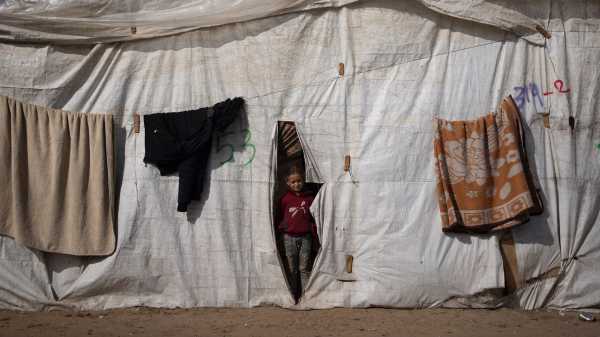
Save this storySave this storySave this storySave this story
The notion of having to one day repent for one’s trespasses gives even the godless a fright, we assume. A kicker like “You’ll regret this!” is redoubled by the certitude of a not-yet-felt emotion—how bad one will surely feel when the now becomes the later. No one wants to someday be found the fool. That potential regret resides, affectively if not quite grammatically, in the future-perfect tense, which, per the Oxford English Dictionary, expresses “an event or action viewed as past in relation to a given future time”: What will have come to pass. This is a version of the future not only understood in tandem with the present but also disciplined by it—and a version of the present which is very sure of our capacity to remember, and to feel.
As Israel gluts the present with death and destruction, the future perfect has become a means of stirring timid Americans out of indifference and into something like sympathy for Palestinian lives. As riot police climbed the ladder atop an armored truck—nicknamed “the Bear”—into an occupied hall at Columbia University in late April, in a widely circulated image, the Jacobin podcast host Daniel Denvir remarked, “This image will be in the history books and the people who authorized or cheered it on are going to look like shit.” In one sweet protest photo, an older woman holds high a sign: “YOUR SILENCE WILL BE STUDIED BY YOUR GRANDKIDS.” That premonition in full, as found on other signs, in social-media posts, and on a bumper sticker available for purchase online, includes the following question: “Will you admit you were complicit when they ask how the world let it happen?” Headlines and images have been received as if they are lessons for the future, lamented for how unfortunate this will all look later. A statement from the U.N. Secretary-General, António Guterres, supporting an “immediate humanitarian ceasefire” back in October, declared, “This is a moment of truth. History will judge us all.” Eight months on, the same line of rhetoric is repeated with identical urgency. “History will judge what we do right now,” Bernie Sanders wrote in April. (In December, after months of urging from staffers and supporters, Sanders called for a humanitarian ceasefire; he has yet to call for a permanent ceasefire in Gaza.) Those who have yet to do so are implored to join the “the right side of history,” another common refrain. Altogether, the appeals go something like, One day, when this moment is history, this will have been a shame and you will regret your silence. The statements adopt an imperative from the future, which, it’s said, will be the best arbiter.
Such expressions attempt to offer clarity on the present by viewing it through the lens of the future. And not just any future, but one that is capable of properly judging the past—our present—via a thing called history that only awaits our setting it down. It is this historical looking back that will find silence, reticence, and equivocation deficient, the logic goes. The future-perfect formulation borrows against tomorrow’s sorrow—you will regret—in the hopes of foreclosing today’s inaction, the silences. It must borrow shame because the consensus doesn’t feel it, not yet, not today. But perhaps someday, when all’s said and done, we all might feel, and perhaps that sense of retrospective shame—rather than today’s reality of Palestinians being killed, maimed, and starved by an apartheid nation sustained by U.S. largesse, our weapons, our policies and politicians, our sitting President—might provoke a unified sentiment. But how robust is this “might”? What fortitude may be gathered from a feeling unfelt in its own time?
The future perfect means very well. Its retrofit foreboding is really a form of optimism. It summons wisps in the shape of generations to come, those children of whom we’re always thinking, seated one day to receive wisdom in the Platonic image, a bipartisan image, of the social-studies classroom. In this imagined place of learning, yesteryear’s sins have been cordoned off and arranged in a pat past tense for these children of tomorrow, whose curiosity regarding distant events presents, at worst, the conditions for an uncomfortable discussion around the family dinner table. A child might wonder just what Granny was doing while our grand nation (in this hypothetical future apparently still standing) was on its less than best behavior. (“Will you admit you were complicit when they ask how the world let it happen?”) If we suppose that she—you—will squirm at this line of inquiry, it follows that the remedy for that supposed latter-day discomfort is a firm present-day conviction. We are less inclined to question what this version of the future presupposes regarding the accuracy and depth of what the history lessons will one day teach our progeny about our now.
Our now: Homes and universities raided and bombed into ruins. Cemeteries desecrated. Shells of schools and hospitals that had become shelters for fleeing Palestinians only to be struck from above or shot at and set ablaze. Bodies retrieved from rubble, painstakingly, by the dozens. Since October, Israeli forces have detained thousands of Palestinians throughout the occupied West Bank and, in Gaza, thousands more of all ages, including journalists and aid workers; many have reported abuse. Throughout Gaza, Palestinians are suffering starvation as at least two senior Israeli officials have openly admitted their opposition to letting in humanitarian aid and Israeli protesters have raided en-route aid trucks. Meanwhile, Israel continues its front into Rafah to do what we have seen be done again and again in actions that exceed tidy summation.
For those whose hope of converting people to the cause of Palestinian life rests on the promise of saving face in a far-flung time, the implicit belief is that the time to weigh in decisively has yet to come. This is another way of saying that only history can judge—never mind our understanding, so common as to be banal, of how selectively history is made. One need not know the names of post-structuralist thinkers to possess an inkling of how power exerts its influence upon Western memory—history to the victors and all that. In this year’s State of the Union address, Joe Biden, like every President, had the future’s historical memory in mind. “History is watching” was his refrain. In reference to the right-wing book bans that seek to purge any regret or bad feeling from the teaching of our nation’s story, he bellowed, “Instead of erasing history, let’s make history!” In April, Biden approved legislation providing an additional twenty-six billion dollars in what’s called aid to Israel. Weeks later, in May, the Administration informed Congress of its plan to approve a new arms deal for Israel worth $1 billion. This is the history in the making to which Biden heartily signs his name.
It is fitting that the adage that history repeats itself is, in fact, a misquote. “Those who cannot remember the past are condemned to repeat it,” the Spanish-American humanist George Santayana wrote in 1905. As any thinking adult must surely know by now, history seethes with untold narratives. In a revered book-length study, “Silencing the Past: Power and the Production of History,” first published in 1995, the late Haitian anthropologist Michel-Rolph Trouillot examines how the suppressed history of the Haitian Revolution—in which a slave uprising liberated the colony of Saint-Domingue from French rule—models the problem at the core of historiography. As Trouillot asks, “If some events cannot be accepted even as they occur, how can they be assessed later?” We can today observe how institutions participate in rendering all kinds of oppressed lives unthinkable, Palestinian lives among them, including with headlines that attribute violence to no actor in particular, as if it were just the natural course of things. The silences and vague noises of support, with their implied opinion that it’s too soon to make a call, begin to look perverse in the long time frame of the Nakba, the protracted and repeated expulsion of Palestinians that paved the way for the region’s present conditions.

Palestinians mourn relatives at a hospital morgue in Rafah.
There is a mordant joke among leftists that liberals support every resistance movement except the ones unfolding in the present tense. For the unmoved, it seems that it is never the right time to make a fuss—leave it to history to sort what will have been justified. But the future perfect is no place to hide. We cannot borrow from its smug satisfaction, trust that time will do its thing. In an article published last year, the political theorist Bedour Alagraa considers, with reference to Martin Luther King, Jr., the stultifying effects that this presumption has on political thinking. King’s “Letter from Birmingham Jail” critiques “the strangely irrational notion that there is something in the very flow of time that will inevitably cure all ills.” Yet we often still operate under that very assumption, aided, perhaps, by that other frequently circulated King quote regarding “the arc of the moral universe.” This reasoning has a way of foreclosing what might be because of what is. And yet, Alagraa adds, “Nothing at all in our understanding of the world, and its vast and varied histories, is inevitable.” Her work, drawing upon that of the Jamaican theorist Sylvia Wynter, steers us away from a passive relationship to time as an inevitable progression of things. In her 2021 essay, “The Interminable Catastrophe,” she argues that the “interminable” nature of certain disasters—such as the climate crisis, such as colonialism—might be better understood, she argues, as a pattern of repeat predicaments that can be “thrown off course.” Radical change, in other words, happens in diametrical opposition to the limited imagination enshrined in the future perfect. “Nothing, not capitalism, not climate change—nothing is an historical inevitability, things are always vulnerable to interruption,” Alagraa writes.
It should go without saying that the case for Palestinian life rests in the here and now. We are already late. In 1982, at the start of Israel’s invasion and occupation of southern Lebanon, the magazine In These Times, published a piece by Edward Said, who wrote of Palestine as “a kind of wedge opening up the discrepancy between Israel as it has appeared internationally and as it is in fact.” The U.S. media, he observed, was “rife either with on-the-spot reductive reporting” or “endlessly dreary commentary . . . that skirt the issues.” Now, as then, the question of Palestine trends toward abstraction, basing right and wrong on how a future that may or may not come to pass may or may not remember this. But those who look to be convinced by the future have, in fact, already detached themselves from the present-tense reality of Palestine. This Palestine is embodied in the plain existence of every living Palestinian “displaced, dispossessed, dispersed by Israel,” Said wrote. “For them the idea of Palestine is adequate to their real memory, their actual present and their minimal requirements for the future.” For them, there is history enough. ♦
Sourse: newyorker.com
